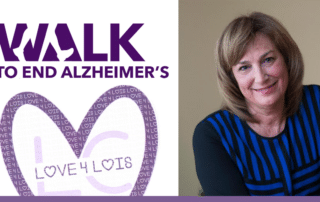Every year, thousands of Americans lace up for the Alzheimer’s Association Walk to End Alzheimer’s—the world’s largest fundraiser for Alzheimer’s care, support, and research. And every year, our team walks for our dear friend and former co-worker Lois, who is living with this disease. Lois’s grandson, Jared Fisch, pens an anecdotal essay on what it looks like to be on the other end of Alzheimer’s watching a loved one change before you. Read on below and join the Rothkoff Law Group – Love for Lois team in the Walk to End Alzheimer’s.
She’s Not Who She Used to Be
I speak about my grandmother in the past tense. She hasn’t died; she has Alzheimer’s. Alzheimer’s doesn’t just erase the memory of the individual fighting the disease, it creates a new memory for those who love them most. I struggle to remember what my Bubbie, Yiddish for “grandmother,” was like before Alzheimer’s consumed her. Flashes of her New York accent hit me from time to time when I say words like “chocolate” or “coffee,” but thinking of her reminds me of who she is now.
Bubbie has been on hospice for over a year now, clinging on to whatever life she has left. She’s beyond the point of forgetting names, which is what people typically associate with Alzheimer’s. Bubbie cannot string together a coherent sentence, and most of the time, she struggles to simply exist.
This is how I picture Bubbie now while I’m over a thousand miles away from her at college. It’s difficult for me to picture old memories of her in the stands cheering me on at my Little League baseball game or imagine her dancing around the house singing her favorite Jersey Boys song: “Big Girls Don’t Cry.”
Alzheimer’s did not act slowly when it took Bubbie from us. She was young for a grandmother to begin with: her first grandson was born just two days before her 50th birthday. Less than twenty years later, she would be diagnosed with Alzheimer’s at the age of 69. My mom hid this from me and my brother for a while but eventually it became too obvious to conceal. In 2018, a year after her diagnosis, it was challenging for Bubbie to attend my high school graduation.
The rapid deterioration of her physical and mental well-being was difficult to watch. Her already thin frame became thinner, shedding over 25 pounds unintentionally. However, the bed-ridden woman who no longer fits in the jeans she wore five years ago is not how I choose to define Bubbie. She was outgoing, spontaneous, and willing to give the shirt off her back to help others. When she was visiting family in Australia, Bubbie’s youngest grandson wanted to ride an elephant at the Melbourne Zoo but needed an adult with him. Bubbie jumped at the opportunity when nobody else would. Just imagine a Jewish grandmother riding an elephant in Australia; it always makes me laugh.
She loved. She cared. She laughed. She smiled. She fought Alzheimer’s so that it wouldn’t take her from her family. She’s losing.
Going against Jewish tradition, Bubbie has a tattoo of a heart on her right hip. In January of 2020, my mom received a call immediately after landing in Maui, Hawaii, for our family vacation. With tears streaming down her face, we didn’t know if Bubbie would make it through the week. Over 4,000 miles away, we considered booking the next flight home, but Bubbie wouldn’t have wanted that. So selflessly, she sent us a rainbow telling us to stay and enjoy the once-in-a-lifetime trip. On that trip, my mom, dad, brother, and I would all get tattoos for Bubbie.
The heart on my right thigh helps remind me of who she was rather than who she has become. She’s losing her battle to Alzheimer’s, but I’m never going to lose her. The impact Bubbie had on my life will not go away when she does. Alzheimer’s does not define Bubbie, her strength and courage do.


